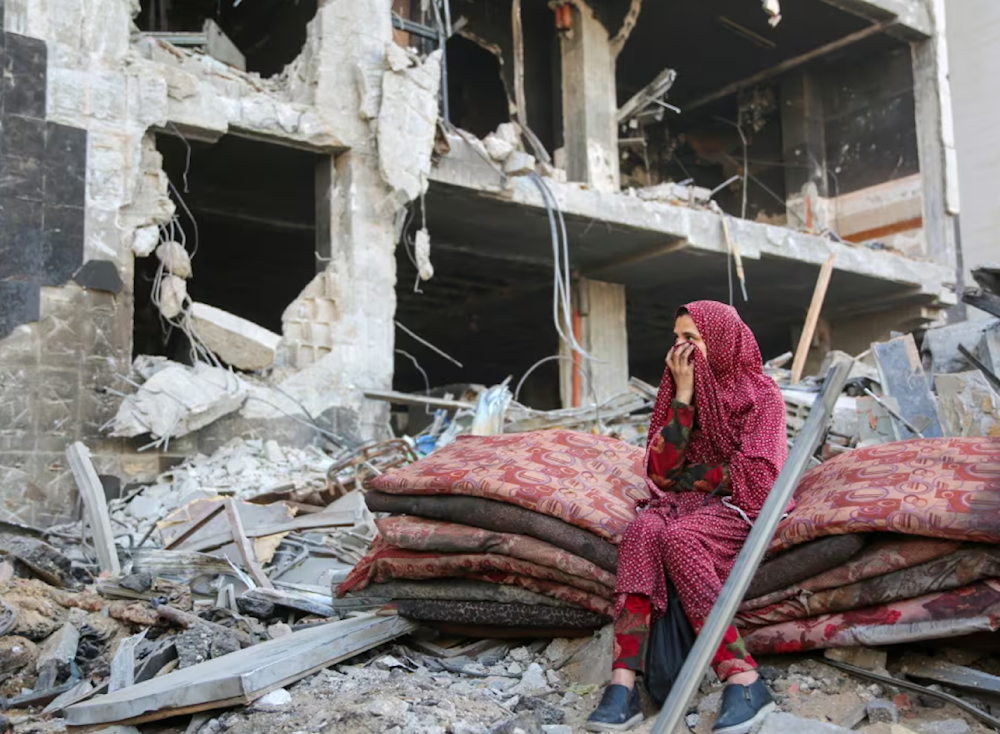'An empty shell with human graves': WHO on Gaza's Al-Shifa Hospital
The WHO says that "numerous shallow graves" of those killed had been dug outside the emergency department with some limbs still showing, depriving them of dignity.
-

A woman sits amid the rubble of Gaza's Al-Shifa hospital on April 1, 2024. (AFP)
"Israel's" recent siege and attacks have reduced Gaza's main hospital to rubble, leaving behind an "empty shell" with many dead as they withdrew from it, the World Health Organization (WHO) reported on Saturday.
The Government Media Office in Gaza denounced on April 1 the occupation's crime in the Al-Shifa Medical Complex, pointing out that "Israel" killed more than 400 Palestinian civilians in the hospital and its vicinity and detained around 300 people while almost 100 remain missing.
Israeli occupation forces (IOF) evacuated Al-Shifa Hospital in Gaza City on Monday following a two-week of what they called a "military operation" in which they claimed to have engaged Palestinian "militants" inside what was once the Palestinian territory's most major medical complex.
A WHO-led delegation finally gained access to the hospital on Friday, following many failed efforts since March 25, according to the United Nations health organization.
Doctors Without Borders (MSF) said it is horrified that the Al-Shifa Hospital "is in ruins after a 14-day-long operation by the Israeli occupation forces in and around the facility."
In a statement on X, it added that Gaza's largest hospital is "now out of service."
It discovered considerable devastation and heard claims that patients were "held in abysmal conditions" during the siege, with some dying.
WHO Director-General Tedros Adhanom Ghebreyesus wrote on X: "WHO and partners managed to reach Al-Shifa -- once the backbone of the health system in Gaza, which is now an empty shell with human graves after the latest siege."
.@WHO and partners managed to reach Al-Shifa — once the backbone of the health system in #Gaza, which is now an empty shell with human graves after the latest siege. The team witnessed at least five dead bodies during the mission.
— Tedros Adhanom Ghebreyesus (@DrTedros) April 6, 2024
Most of the buildings in the hospital complex… pic.twitter.com/jSKVfZkR5f
The WHO stated that "numerous shallow graves" had been dug outside the emergency department with some limbs still showing.
Abysmal conditions
"At least five bodies lying partially covered on the ground, exposed to the heat," he continued.
The statement detailed that the team reported bodies partially covered, decomposing, with the smell engulfing the Hospital.
The WHO emphasized that "safeguarding dignity, even in death, is an indispensable act of humanity."
The IOF, however, lacks any humanity, despite Netanyahu's claims of it being "the most moral army in the world," and the organization reported a severe lack of food, water, and hygiene, noting that the devastation in the facility has rendered it "completely non-functional" with patients reportedly held in "abysmal conditions during the siege."
Read more: The army that killed over 21,000 is the ‘most moral’, Netanyahu says
Additionally, at least 20 people died "due to a lack of access to care and limited movement authorized for health personnel."
Ghebreyesus stated that efforts by WHO and other relief organizations to restore basic services at the Al-Shifa following "Israel's" first catastrophic strike on the hospital last year "are now lost."
Only 10 of Gaza's 36 main hospitals remain somewhat functional.
Ghebreyesus called for urgent action to protect the remaining health complexes as "famine looms, disease outbreaks spread and trauma injuries increase," adding that a "functional deconfliction mechanism" was needed for the safe and unhindered access for aid missions to safely deliver supplies.
The WHO reported that "despite deconfliction, yesterday’s mission faced significant delays at the military checkpoint en route to Al-Shifa hospital," adding that "between mid-October and the end of March, over half of all WHO missions had been denied, delayed, impeded or postponed" by the IOF.
The organization detailed that it was this deconfliction system that was crucial to delivering humanitarian aid and that without it, there are major obstacles in delivering aid "anywhere close to the scale needed."

 4 Min Read
4 Min Read








